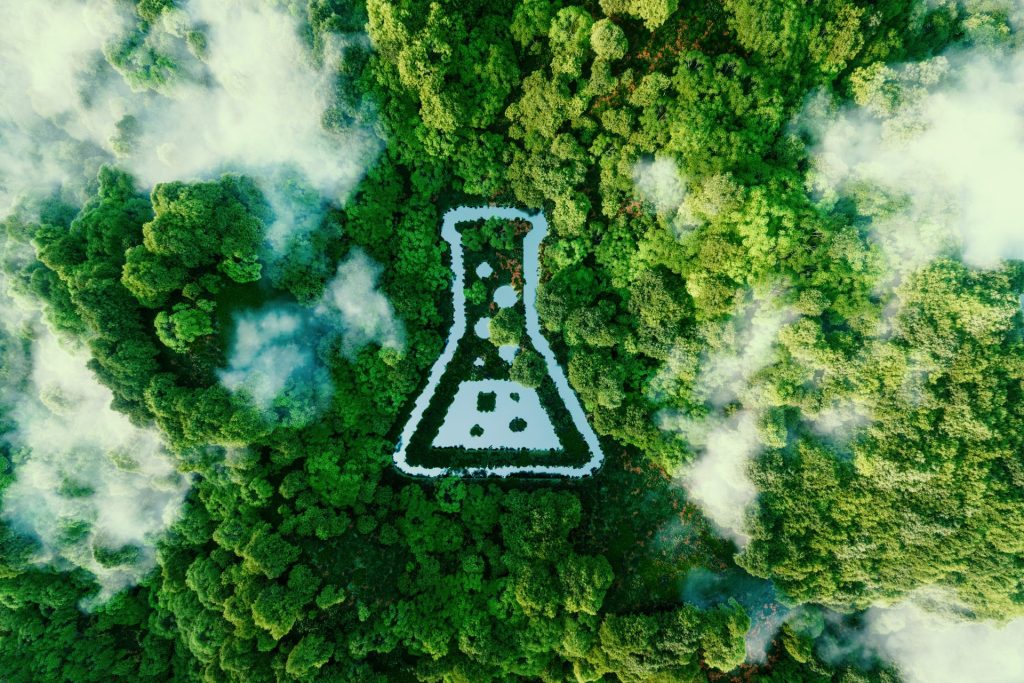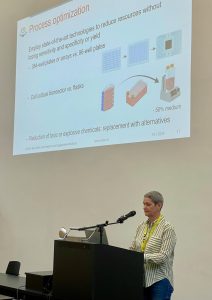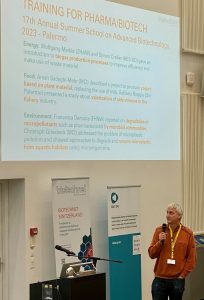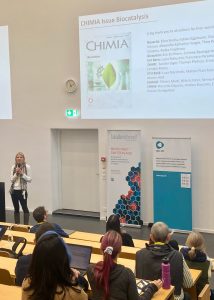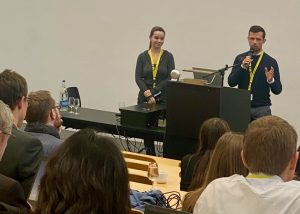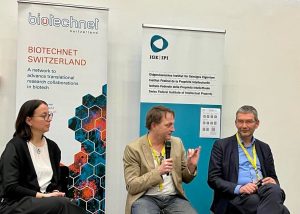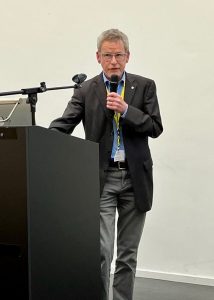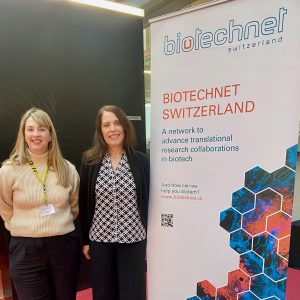Description
About 65 participants attended the Biotechnet Meet-Up on January 18, 2024 at the University of Bern, UniS. This year's event focused on sustainability in biotech.
The morning featured presentations by Biotechnet thematic platforms. Each platform described how its research is contributing to sustainability, as well as challenges it is facing in making its practices more sustainable.
In the afternoon, we welcomed 3 keynote speakers, 3 panelists and an IP expert who provided insights on this year's theme.
Keynotes
Keynote speakers Sebastian Kahlert and Franziska Brändle from ETH Zürich summarized the Green Labs initiative, which was identified as a hot topic that members wanted to learn more about. The key takeaways from their presentation were:
- Collaboration is Key: Connect with other labs and central sustainability units to learn about existing efforts - you do not have to reinvent the wheel - there are many resources already out there (e.g. LEAF, MyGreenLab etc.)
- Mindful Procurement: Consider the environmental impact before your purchase - do you really need this? Or does a neighboring lab have the equipment/chemical already? If you buy, opt for sustainable alternatives and support eco-friendly vendors!
- Procedures and Protocols: Evaluate lab procedures to identify opportunities for material savings and waste reduction - and add them to protocols. Small changes can make a big difference!
- Energy Efficiency Matters: Simple steps like cleaning freezers and adjusting their temperatures can significantly reduce energy consumption. Let's collectively strive for a greener, more efficient future!
- Ditch Single-Use Plastics: Take the plunge and replace single-use plastics with reusable alternatives. From autoclaved glass pipets to glass cylinders, the choices are there to make a positive impact!
Visit their Miro board - Leaf Criterial Idea Collection - for pratices you can implement in your lab. The second keynote presentation by Prof. Dr. Francesca Paradisi focused on advances in green synthetic strategies and flow catalysis.
Industry Panel
- Samantha Paoletti - CSEM Dr. Paoletti opened the discussion by stating that CSEM is contributing to a number of UN Sustainable Development Goals. She stressed that some products can both contribute to and hinder progress. For example, providing fast and affordable diagnostic tests helps advance goal 3, Good health and well being, but these tests also generate a large amount of single use plastics, working against the Goal 12, Responsible consumption and production and Goal 13, climate action. Thus in their diagnostic development projects, CSEM is looking at how to make diagnostic tests more sustainable both in terms of the materials they are made of and the energy that they use.
- Jan Lucht - Science Industries Dr. Lucht highlighted two interpretations of the theme Sustainability in biotech: how can biotech itself be made more sustainable, for example by looking at how to improve the biotech R&D and production processes and reducing lab consumables; and how can biotech contribute to sustainability, for example by replacing chemical synthesis with a biotech process, by using renewable raw materials instead of fossil ones or botanicals with limited availability. His activities at scienceindustries focus more on the second question. Deciding which set of norms you use depends on what kind of actor you are and how you can contribute. For scienceindustries member companies, especially relevant are sustainability advantages of biotech production vs. other routes. This is relevant for example for the flavour and fragrance industry, for food and feed additives (vitamins), and increasingly for food production by precision fermentation (e.g. alternative dairy products without animals) or cultured meat. Another relevant sector is the field of carbon capture and utilization, where biotech processes can be used to take carbon dioxide from the atmosphere or from waste gas streams and turned into useful chemicals. As an industry association bringing together science and technology companies, scienceindustries also supports its members in reporting on their sustainabilty intiatives and in sharing information with each other.
- Martin Held - ccLoop Dr. Held leads the work of the ccLoop association, which promotes technologies for the production of defossilised raw materials for the manufacturing of daily life goods. Chemical and pharma companies are participating, as well as SMEs and academic labs. He discussed the need for defossilization and provided insights on different sources of carbon, stating that enough carbon has been extracted from the earth and that we need to focus on capturing carbon from other sources. He identified three sectors in need for low-CO2 reduced carbon (defossilized carbon): Transport (aviation, marine vessels, heavy duty trucks), Materials (plastics, textiles), and Energy storage (e.g. for interim storage of H2 or power). He went over the three categories of emissions and stated that the most difficult ones to combat are category 3, indirect emissions, which are often part of supply chains or baked into the goods and services acquired from partners. Here we need to concentrate on materials and ingredients that are used by many companies in many processes – making sure alternatives exist and increasing their adoption. He underlined the importance of regulatory and tax levers in bringing change: when greener products or processes are most expensive, regulation is needed for companies to make the step-change. He suggested that government procurement of new materials or ingredients can help de-risk and accelerate their adoption.
To acheive an ideal future state, the panel recommendated:
- Cross-sector connections between material, chemistry, biotech, where similar ingredients are needed
- Connections between research phase and market phase – ideas can become reality and have an impact
- Greater understanding from the financial sector of industrial biotechnologies and great willingness to invest in this area
- Political will to place industrial biotech on the same level as ‘red’ biotech
Intellectual Property Landscape
The final presentation of the day by Christian Moser Nikles from the Swiss Institute of Intellectual Property spoke to the difficulty in arriving at a single definition of “What is sustainable biotech?“ Dr. Moser Nikles applied a variety of filters, including UN Sustainable Development Goals, to map out leading technologies and key discoveries that could be considered sustainable, such as agriculture and food, sustainable production, advanced materials and manufacturing, biofuels, and greenhouse gas emission reduction. He also presented which countries and institutions are leading the way in sustainable biotech patents. Excluding the development of medicines and diagnostics reveals that Switzerland does not have a leading position in sustainable biotech patents, but that its public research institutions, when grouped together under the Swiss technology transfer association (swiTT), form the largest holder of these patents in the country. There is thus much room for more private innovation in the sustainable biotech sector in Switzerland.
